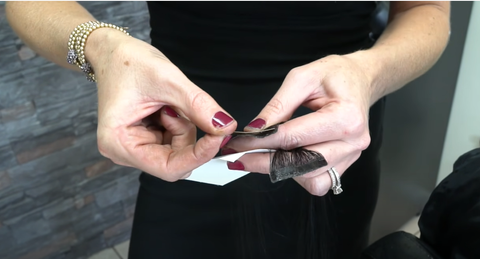HOW TO REMOVE AND RE-APPLY TAPE EXTENSIONS
Hey dolls, were your tape-ins installed a while ago? Ready to take them out and start fresh before your reinstall? There will come a time when you will need to remove your tape-in hair extensions yourself, quickly. In this article, we’ll show you everything do to remove your tape-in extensions without damaging your hair. There are certain techniques and tips that might surprise you. You should use these tips for the best results and as little stress as possible. Lucky for you, tape-in extensions are one of the easiest to remove because of how gentle the process is, so you got this!
Go to a Professional
Of course, you can take your tape-ins out yourself, but the safest and most effective way to remove them is to seek professional assistance from a licensed salon professional. This way you can be sure that the removal is done 100% correctly and without damage. Most salons that do tape-in installs also do removal of the tape-ins, so be sure to do your research on salons near you that do this service.


Oil-Based Removers
Oil-based removers for tape-in extensions can be a variety of different types of oil, olive oil and coconut oil being the most popular. You can also find Argan or Moroccan oil if that’s what you prefer. This method typically requires you to layer the oil at the top of the tape and allow time for the oil to seep in between the tape to loosen the tackiness. Additional oil may be used to help peel the tapes back to make sure the removal is as seamless as possible. Marinate the tape with your oil of choice, then massage the tape until it gently peels off of the hair cuticle. There might be a small amount of hair shed, but don’t be alarmed, since this is normal after wearing this style for a few weeks.
Using Conditioner
Conditioners can be used the same way as oil to help remove the tape in hair extensions. This process takes more time and patience than oil, however. In many cases, massaging the tab area can help loosen the stickiness and allow the conditioner to seep in between the tape tabs. Of course, since it’s not specifically used for tape-in removal, the process won’t be as seamless. But if you want a cheap option where you can use something you already have lying around, this can be a good option for you.
Alcohol-Based Remover
Alcohol-based removers are generally in liquid spray form. These removers are sprayed directly above the tape in the extension tab. Allow time for the alcohol-based remover to seep down in between the tapes and gently peel apart. Use the additional spray as the corners are lifted to aid in the removal process. Some people have found that a simple mixture of household alcohol (rubbing alcohol) water and a few drops of essential oil are the perfect combination of gentle removal. The essential oils add a pleasant scent during the removal process. This is also a way to protect your hair by adding a natural oil if you don’t want to balance out the chemicals on your hair.
Use a Combination of Both
A combination approach of all of the home options above can be very effective. Start by applying oil to every tape tab, massaging the oil in. Then, while showering, apply a generous amount of conditioner directly on the tape tab, massaging each one liberally with the conditioner gently. Upon leaving the shower, spray your alcohol-based remover above the tape tab and gently peel them apart, applying additional spray or oil as needed to aid in the removal process. If you don’t want to stick with just one process, this could be a good option for you.
HOW TO RE-APPLY TAPE EXTENSIONS?
Simply take one tape tab, place on top of the sticky side of the piece and then remove the paper backing when applying.


Now that all pieces are ready to be reapplied, install them as normal! Yep – it’s that easy!


Dejar un comentario